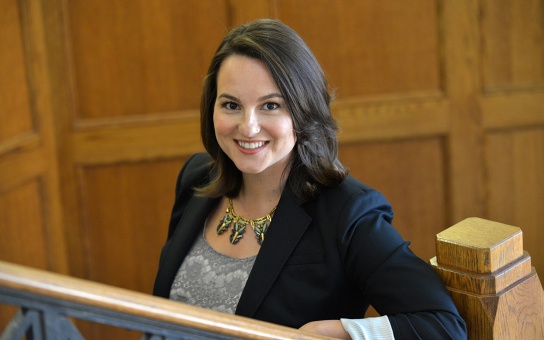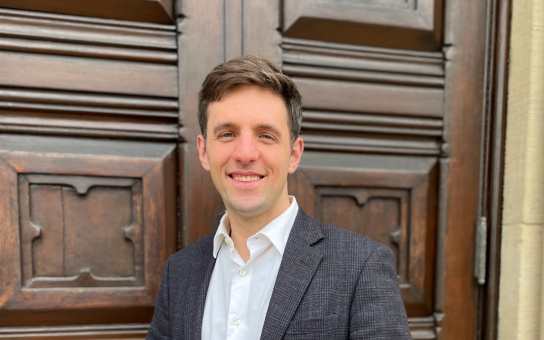
Mental health and marriage timing

Decades of research document powerful associations between parents’ characteristics and children’s marital behaviors. “Parental mental health strongly shapes or disrupts family life and long-term opportunities for children—although its influence has largely been ignored in the literature,” explains William G. Axinn, interim director of the Ford School’s International Policy Center.
In a new study, Axinn investigates the dynamics between the social organization of families and parental mental health using data from over 10,000 individuals in the Chitwan Valley, Nepal. Setting his research in Nepal— with its near universal marriage and childbearing practices and pronounced gendered household roles—offered a context to examine the effects of both mothers’ and fathers’ depression on the children.
Depression may affect a parent’s ability to work and may increase spousal conflict, which can lead to a child’s earlier departure from home. Specifically, Axinn focused on the timing of marriage, a factor with significant longterm economic, educational, and health implications.
Axinn’s findings suggest a father’s history of depression— regardless of onset—is associated with a son’s faster entry into marriage, but not a daughter’s. Axinn explains that in Nepal, many children do not independently choose their spouses. However, sons generally have more involvement and autonomy in spousal selection, making it more likely they opt for marriage as a means of leaving home.
Mothers’ depression is a predictor of their daughters’ marriage timing, but not sons’. The association between mothers’ depression and the timing of their daughters’ marriages is observed primarily when mothers experience postpartum depression during their daughters’ early years.
“There is no shortage of evidence that parents strongly influence their children worldwide, including in marriage timing. That means these powerful consequences of parental mental disorders are likely to affect children everywhere, and depression is the most common mental disorder worldwide,” says Axinn.
He concludes, “Young marriages often disrupt educational attainment, reducing employment opportunities, lifetime earnings, and access to health care. Moreover, treating parental mental disorders can reduce the consequences on their children.”
Mixed reactions: How Americans view carbon capture and utilization

Although the U.S. has the second highest emissions by region globally, it is doing less to reduce carbon emissions compared to its European counterparts.
This backdrop frames the context for a recent study by social psychologist Kaitlin Raimi that highlights the complex process of gaining public support for emerging technologies aimed at combating climate change.
Raimi’s research investigates the public perception of carbon capture and utilization (CCU), a technology designed to reduce emissions by repurposing captured carbon dioxide into commercial products such as fuels, concrete, and plastics. The study finds that while Americans generally view CCU favorably, the level of support varies.
Respondents were optimistic about the economic advantages of CCU. However, they were more skeptical about its potential health benefits and its effectiveness in slowing climate change. In addition, while they looked favorably towards CCU in an abstract sense, their support waned when considering implementation in their local communities. Concerns included the infrastructure required to create CCU consumer products, such as changes in land use and the risk of CO2 leakage.
These concerns were particularly pronounced among certain demographics. Participants identifying as environmentalists and those “comfortable tampering with nature” were more supportive of CCU. Conversely, racial and ethnic minorities expressed heightened concern about local environmental risks compared to white Americans, likely due to their greater exposure to environmental hazards.
Raimi concludes, “It is crucial to include diverse stakeholder communities in any decision-making about CCU, whether about siting new industrial facilities or offering new CCU products in the market.”
Unequal influence

Federal agencies are powerhouses of U.S. lawmaking. In 2023 alone, federal agencies finalized over 3,000 legally binding rules, while Congress and the president enacted only 30 substantive bills into law.
Political scientist Devin Judge-Lord’s new working paper examines the influence of wealthy organizations in shaping agency rules, shedding light on how these pressures shape U.S. democracy.
Analyzing over 260,000 comments from more than 6,000 organizations on the Dodd-Frank Act’s draft rules, JudgeLord and his co-authors found that wealthy organizations, particularly for-profits, like banks, participate more often in rulemaking and enjoy higher success rates in getting their concerns addressed in final policy.
The secret to their success? Wealthier organizations can afford to hire more experts and lawyers to draft sophisticated comments on proposed rules. These well-constructed comments are more likely to be incorporated into final rules. This emphasis on technical and legal expertise, rather than campaign donations or general lobbying expenditures, seems to be the key to influencing executive branch policymaking.
This systemic tilt toward wealth driven influence is more pervasive than previously understood, deepening democratic inequality. To mitigate this, Judge-Lord calls for reforms that would offer legal and technical assistance to less-resourced organizations, enabling them to produce more sophisticated policy comments.
Judge-Lord’s research has been cited by the U.S. Office of Information and Regulatory Affairs to guide executive departments and agencies in strengthening public participation in the regulatory process. An early version of the paper won a 2021 American Political Science Association award.
» Read “Inequality in Agency Rulemaking,” a working paper published in August 2024.
More in State & Hill
Below, find the full, formatted fall 2024 edition of State & Hill. Click here to return to the fall 2024 S&H homepage.
More news from the Ford School